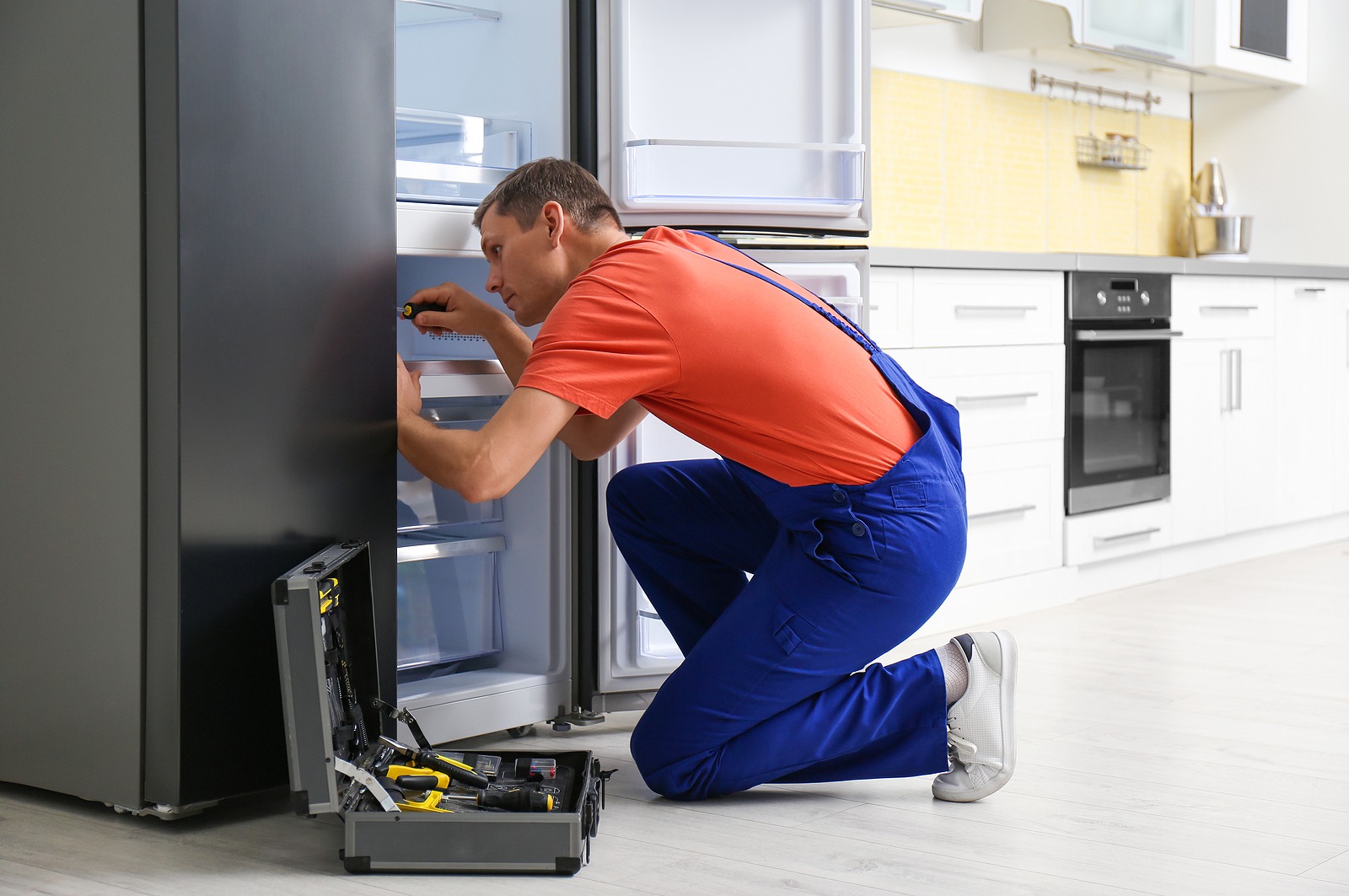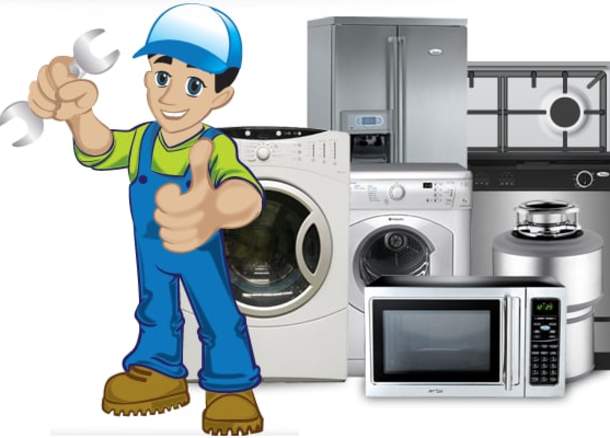Quick Guide to Fixing Fridge Issues – Dependable Refrigeration & Appliance Repair Service Washing Machine Repair
Quick Guide to Fixing Fridge Issues – Dependable Refrigeration & Appliance Repair Service Washing Machine Repair
Blog Article
The Ultimate Guide to Understanding Home Appliance Repair at Home
When your refrigerator stops cooling down or your oven refuses to warmth, it can really feel overwhelming. Comprehending appliance fixing in the house can save you time and money. You'll learn to identify symptoms, utilize essential tools, and comply with a methodical troubleshooting procedure. Before you begin, there are important security preventative measures you need to take into account. What are one of the most common problems, and just how can you fix them? Let's explore the essentials.
Typical Device Troubles and Their Signs
When your home appliances start breaking down, it's important to identify the indications at an early stage. Ignoring them can cause bigger issues and expensive repairs. If your refrigerator isn't cooling down properly, you may notice cozy places or condensation creating. This might show a stopping working compressor or an obstructed vent.Your dish washer may show troubles with unclean dishes or unusual noises throughout cycles. If you hear grinding or clanking, it's time to investigate.A washing equipment that will not spin or drain can leave you with soaked washing, suggesting a blocked drain or a malfunctioning pump.Lastly, if your oven's temperature level seems off or it takes forever to pre-heat, you may be taking care of a faulty thermostat. By remaining sharp to these signs and symptoms, you can deal with concerns prior to they intensify into significant fixings.
Necessary Tools for Device Repair
When you're tackling home appliance repair work at home, having the right devices is essential. Fundamental hand devices like screwdrivers and pliers will assist you dismantle and repair different home appliances, while electrical testing devices guarantee you're working securely with circuitry. Let's look at what you require to obtain begun on your fixing trip.
Basic Hand Devices
Having the right tools is important for efficient appliance repair work in the house. Start with a reliable screwdriver collection, including both flathead and Phillips types, as screws are common in appliance setting up. Pliers are also essential; they assist with gripping, turning, and reducing cords or little components. A pair of needle-nose pliers can reach difficult situations quickly. You'll require a great adjustable wrench for tightening or loosening up nuts and screws. An energy knife comes in handy for puncturing packaging or insulation. Lastly, do not fail to remember a tough workbench or surface area to securely organize your devices and components. With these standard hand devices, you'll be well-prepared to deal with most appliance repair services that come your means.
Electrical Testing Instruments
Along with standard hand tools, electrical testing tools play an essential function in appliance fixing. These devices help you detect electric problems and warranty devices work securely. A multimeter is crucial; it determines voltage, current, and resistance, allowing you to pinpoint troubles promptly. A non-contact voltage tester is another must-have, allowing you detect live cords without making straight call, boosting your safety and security. Clamp meters are fantastic for measuring current circulation in cables without detaching them, saving you effort and time. Additionally, circuit testers can rapidly inspect if outlets are functioning properly. By utilizing these tools, you'll simplify your troubleshooting procedure and boost your fixing skills, making device maintenance a great deal less complicated.
Step-by-Step Guide to Diagnosing Device Issues
When your home appliance breaks down, it can be frustrating, however identifying the issue doesn't have to be frustrating. You'll discover to determine common troubles and use reliable troubleshooting methods. Let's go through the steps to obtain your appliance back in functioning order.
Typical Appliance Troubles

Troubleshooting Techniques Clarified

Fixing Significant Kitchen Appliances: A Closer Look
Have you ever asked yourself just how to deal with common issues with your cooking area devices? Fixing major kitchen area home appliances like fridges, ovens, and dish washers can be easier than you assume. Beginning by identifying the trouble-- whether it's a refrigerator not cooling down or an oven that will not heat. Commonly, a basic reset or examining the power resource can resolve the issue.For fridges, tidy the condenser coils and examine the door seals. If your stove's not heating, examine the heating element and thermostat. Dishwashing machines could simply require a tidy filter or a reset to obtain them back at work. Constantly disconnect the appliance prior to diving into fixings to ensure your safety.Don' t fail to remember to speak with the customer handbook for specific troubleshooting pointers connected to your model. With a little bit of perseverance and the right devices, you can confidently take on home appliance repairs and save cash at the same time!

Troubleshooting Washing Appliances: Tips and Techniques
When your washing home appliances begin breaking down, it can feel overwhelming, but fixing them doesn't have to be a trouble. Start by inspecting the power supply. Validate the appliance is plugged in and the outlet is working. Next off, check the door or lid button; a faulty button can prevent the machine from operating.For washing machines, if it's not spinning, examine for out of balance tons. Rearranging the clothes might solve the problem. If your dryer isn't home heating, tidy the lint filter and check the air vent for blockages.Listen for uncommon noises; they can show a problem. If your device is dripping, examine the hoses for cracks or loose connections. File any kind of mistake codes presented on electronic displays, as they can direct you in recognizing the issue. Ultimately, speak with the customer manual for certain fixing suggestions associated with your version.
Safety Preventative Measures to Take Throughout Fixes
Before you start any type of appliance repair work, it's crucial to focus on security to stop mishaps or injuries. Disconnect the home appliance or turn off the circuit breaker to guarantee no power reaches it while you work. Usage shielded tools to decrease the threat of electrical shock. Wear safety and security goggles and gloves to safeguard yourself from sharp sides or debris (Lg Dryer repair near me Dependable Refrigeration & Appliance Repair Service).Make specific your work space is tidy and well-lit, so you can see what you're doing. Keep children and animals away from the location to prevent interruptions and potential threats. If you're handling gas appliances, be extra cautious; look for leakages before proceeding.Take your time, and don't rush through repairs. If you really feel uncertain concerning any step, it's much better to pause and research than to guess. Following these preventative measures will aid develop a safer environment for your do it yourself device repair work project
When to Call a Professional for Aid
How do you recognize if it's time to call in a specialist for device repair services? If you have actually attempted fundamental troubleshooting without success, it's a clear indicator. If your visit this web-site appliance still will not begin or shows uncommon sounds after resetting it, do not hesitate to seek expert help.When you observe leakages, smoke, or melting scents, prioritize safety and security and call a professional immediately. These issues can bring about more significant damages or present dangers to your home.Also, if your home appliance is under warranty, speaking to an expert is commonly the best route. They can ensure that repair services won't nullify your warranty, saving you cash in the long run.Finally, if you're uncertain or uncomfortable with complicated fixings, it's smart to leave it to the professionals. Remember, taking on difficult problems without the ideal expertise can cause costly errors. Depend on an expert when in uncertainty!
Frequently Asked Concerns
How Can I Stop Device Issues in the Future?
To stop appliance troubles in the important source future, you must carry out routine maintenance, check for deterioration, clean filters, and stay clear of overloading. Staying proactive will certainly assist extend their life expectancy and maintain them running smoothly.
What Are the A Lot Of Usual DIY Appliance Repair Mistakes?
You might overlook safety preventative measures, skip troubleshooting steps, or use wrong devices when trying DIY appliance fixings. Hurrying the procedure or neglecting supplier guidelines can cause even more substantial concerns and costly errors. Stay person and educated!
How Do I Know if a Part Needs Substitute?
You can inform if a component requires substitute by looking for unusual sounds, leaks, or inconsistent performance. If the device struggles to operate correctly or shows visible damage, it's likely time for a replacement.
Can I Make Use Of Generic Components for Device Repairs?
Yes, you can make use of generic components for appliance repairs, however establish they're compatible - Washer dryer repair service Dependable Refrigeration. Common components might conserve you money, but they can influence performance or long life, so consider your alternatives meticulously before deciding
What Warranties Cover Device Fixes?
Many home appliance service warranties cover repairs for manufacturing problems, yet they often exclude damage from abuse. Inspect your guarantee terms very carefully, as some may require utilizing certified technicians and initial parts for coverage to stay valid.
Report this page